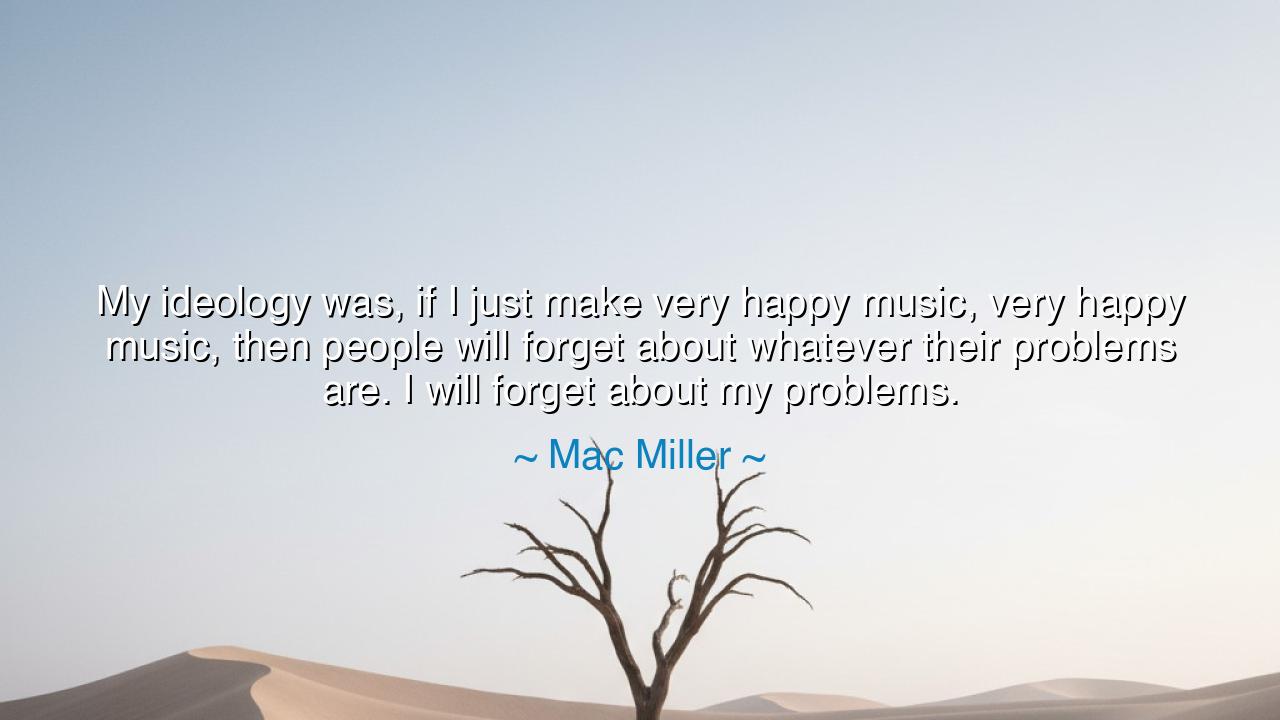
My ideology was, if I just make very happy music, very happy
My ideology was, if I just make very happy music, very happy music, then people will forget about whatever their problems are. I will forget about my problems.






Hear the words of Mac Miller, a soul both radiant and burdened, who confessed: “My ideology was, if I just make very happy music, very happy music, then people will forget about whatever their problems are. I will forget about my problems.” These words, though spoken softly, bear the weight of human longing—the longing to heal through creation, to escape pain by giving joy, to find solace in lifting others. In them we hear not only the philosophy of an artist, but the cry of a heart that sought light amid shadows.
To make happy music was, for him, both gift and shield. A gift, because he believed that sound could carry people beyond their sorrows, if only for a moment. A shield, because in giving joy to others, he hoped to escape the burden of his own heart. This ideology was noble, yet bittersweet—for though it clothed others in sunshine, the one who made it still carried storms within. Here lies a paradox as old as the human story: the healer often bleeds unseen, the entertainer often hides his sorrow behind the mask of laughter.
History shows us this truth again and again. Think of Charlie Chaplin, who brought laughter to millions in an age of war and depression. His little tramp stumbled, was beaten, was mocked—but always rose again with a smile. Yet behind the scenes, Chaplin himself carried deep wounds, struggling with exile, scandal, and loneliness. Still, he believed in the power of joy, just as Mac Miller did. Their lives remind us that sometimes the brightest light is forged in the darkest night, and those who give laughter often need it most.
Mac Miller’s words also speak to the ancient role of art as medicine. Long before modern therapy, people gathered around fire and drum to sing away their fears. Music has always been a balm, a way to lift the spirit when the world grows heavy. By making happy music, Miller tapped into this eternal tradition, becoming both shaman and sufferer, offering relief even as he sought it for himself. His songs were not only entertainment, but rituals of survival, both for him and for those who listened.
Yet there is also a warning here. For though music can ease pain, it cannot erase it entirely. One may forget problems for a while, but unless they are faced, they return, sometimes heavier than before. Miller’s honesty reveals the fragility of relying only on escape, and it calls us to a deeper wisdom: that joy and sorrow must be held together, that laughter must walk hand in hand with truth. To forget is sweet, but to heal is sacred.
The lesson is thus: let your art, your work, your words bring joy to others, for in doing so you create light in the world. But do not neglect your own heart. Do not think that by cheering others you must hide your own struggles. Share joy, yes, but also seek healing. Find those who will listen to your pain as you listen to theirs. For the burden of life is not meant to be carried alone, even by those who make others smile.
So, O children of tomorrow, remember Mac Miller’s wisdom. Make happy music, whatever form it takes in your life—kindness, laughter, generosity—for it will lift others and perhaps lift you too. But also remember to tend your wounds, to speak your sorrows, to walk with honesty. For the greatest music is not only that which hides pain, but that which transforms it into light. In this way, your life itself will become a song—sometimes joyful, sometimes sorrowful, but always true.






AAdministratorAdministrator
Welcome, honored guests. Please leave a comment, we will respond soon